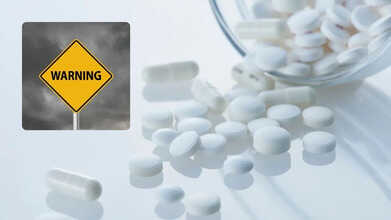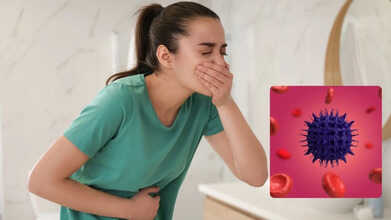- Health Conditions A-Z
- Health & Wellness
- Nutrition
- Fitness
- Health News
- Ayurveda
- Videos
- Medicine A-Z
- Parenting
- Web Stories
India Bans Cough Syrups For Children Under 4 Due To Safety Concerns

Credits: Canva
In a breakthrough step towards safeguarding infant and toddler health, the Government of India has formally prohibited the use of some commonly found over-the-counter (OTC) cough and cold medicines in children below the age of four. This policy move, as notified by the Union Ministry of Health and Family Welfare through a gazette notification, prohibits the use of a fixed-dose combination (FDC) of Chlorpheniramine Maleate and Phenylephrine Hydrochloride—two ingredients found in many pediatric cough syrups.
The decision follows an increasingly vocal global health chorus of alarm at the safety of these products among very young children, India now being among the latest to make strong regulatory moves.
The fixed-dose combination in question has been used to alleviate symptoms of the common cold and allergic rhinitis for a long time. Nonetheless, after reviewing the same, a Subject Expert Committee (SEC) constituted by the Central Government with suggestions from the Drugs Technical Advisory Board (DTAB) opined that this combination is likely to produce risks for children under four years of age—risks overweighing possible benefits.
As per the Health Ministry's statement, "the use of the fixed-dose combination is likely to pose risk to children under the age of four, and safer options to the aforementioned drug are in place."
The government used Section 26A of the Drugs and Cosmetics Act, 1940, to limit the production, sale, and supply of these formulations for pediatric administration in India.
What Are These Drugs?
The now-restricted combination consists of two commonly prescribed ingredients:
Chlorpheniramine Maleate: An antihistamine that operates by inhibiting histamine receptors in the body, relieving symptoms such as sneezing, watery eyes, and runny nose.
Phenylephrine Hydrochloride: A decongestant that constricts blood vessels in the nostrils to narrow them and improve breathing.
Collectively, they've had different brand names and are household essentials in all Indian homes for treating cold as well as allergy conditions. The preparations, though usually safe for adults and older kids, are found to be potentially unsafe for toddlers.
Why the Risk is Greater for Toddler?
Infants under the age of four are at greater risk for side effects due to their immature organ systems and lower body weight. Even normal doses can produce exaggerated physiological effects.
Drowsiness, restlessness, dizziness, or even paradoxical excitation (hyperactivity rather than sedation) can result from chlorpheniramine and be particularly hazardous in infants.
Phenylephrine is a stimulant that can raise blood pressure, induce palpitations, and produce headaches. Its vasoconstricting effect, while useful in nasal decongestion, can impose excessive strain on a child's cardiovascular system.
All these compounds, when used in combination, have an intricate pharmacological profile that can do unintended damage if taken without tight medical surveillance.
Apart from prohibiting the mixture for children under four, the government has asked manufacturers to put a clear warning label on all packaging, inserts, and advertising materials.
The warning that must be used is: This fixed-dose combination shall not be used in children below four years of age.
This choice isn't just a one based on regulation but rather an educational choice as well, trying to notify parents, caregivers, and healthcare workers of the danger of self-medicating infants and toddlers outside of a physician's recommendation.
Are There Safer Alternatives?
Yes, the prohibition is the result of the availability of safer, more targeted alternatives. Pediatricians frequently suggest utilizing saline nasal drops, humidifiers, or warm liquids to relieve cold symptoms in children. In more severe instances, medications targeting specific symptoms are prescribed under close dosage control.
It's crucial to keep in mind that a majority of colds are viral infections that naturally go away by themselves. Medicating symptoms with aggressive medication, particularly in kids under four years old, more often than not causes more damage than good.
What Should Parents Do Now?
- Talk to pediatricians before administering any OTC cold or allergy medication to kids.
- Don't use leftover or adult-strength formulas, even in reduced amounts.
- Read labels before buying drugs and look for the new government-required warning.
- Watch for side effects if the drug has already been taken and obtain instant medical care for any side effects.
India's regulatory action reflects worldwide thinking. Other nations such as the U.S., Canada, and the U.K. had earlier issued guidelines or warnings concerning the use of OTC cough and cold medicines among young children.
In the United States, the FDA recommends against administration of cold drugs to children less than two and cautions against even those two to six. Likewise, the American Academy of Pediatrics (AAP) has cautioned against the use of OTC cough and cold medicines in kids less than four years old as a matter of long-standing concern regarding insufficient benefit and possible risks.
India's move is consistent with this evidence-based strategy, reinforcing the global push toward child-specific formulations, careful monitoring, and public health education.
The prohibition on children under four using cough syrup combinations is an important step towards more rational and safer use of drugs in pediatric care. As greater awareness emerges regarding the subtleties of treating younger children, particularly in non-clinical environments, policy like this one serves to protect the most vulnerable groups.
For parents, the message is simple: drugs that are effective for adults or older kids are not necessarily safe for toddlers. If it's questionable, always call a physician.
NHS Issues ‘Burning Stomach’ Warning Over THIS Common Painkiller

Credits: Canva
Individuals using one of the UK’s most frequently prescribed painkillers should know about a rare side effect that can cause a severe burning sensation in the stomach. While this medication is widely used and taken regularly by many, health experts have now issued a warning regarding this potential reaction.
‘Burning Stomach’ Warning Over This Common Painkiller
Naproxen is a non-steroidal anti-inflammatory drug (NSAID), part of the same group as ibuprofen and aspirin. It helps reduce pain, inflammation, and swelling in muscles and joints. Doctors may prescribe it in tablet or liquid form for conditions like rheumatoid arthritis, osteoarthritis, gout, and menstrual cramps.
It’s also used to treat certain muscle or bone problems, including back pain, sprains, and strains. The duration of treatment can vary, some people only need a few days, while others may require longer-term prescriptions. If you take naproxen for an extended period, your doctor may also prescribe medication to reduce the risk of side effects.
According to the NHS, your naproxen dose depends on why you are taking it, your age, liver and kidney function, and how well it relieves your symptoms. Older adults and people with heart, liver, or kidney issues usually receive lower doses. For children, the dose is calculated based on weight.
Naproxen Side Effects
Like all medications, naproxen can cause side effects, though not everyone experiences them. Common issues, affecting about 1 in 100 people, include:
- Confusion
- Headache
- Ringing in the ears
- Vision changes
- Drowsiness or fatigue
- Dizziness
- Skin rashes
If any side effect persists or causes discomfort, speak with a doctor or pharmacist. In rare cases, naproxen can lead to severe stomach problems, such as intense indigestion, heartburn, or abdominal pain, which may indicate an ulcer or inflammation, according to the NHS.
Naproxen: NHS Issues Warning Over Naproxen
The NHS website claims: "Your doctor may tell you not to take naproxen if you have a stomach ulcer or you have had one in the past. If you need to take naproxen but are at risk of getting a stomach ulcer, your doctor may prescribe another medicine for you to take alongside naproxen to protect your stomach.”
The most common symptom of a stomach ulcer is a burning or gnawing pain in the centre of the stomach. But stomach ulcers are not always painful and some people may have other symptoms, such as indigestion, heartburn and feeling sick.
If you think you may have symptoms of a stomach ulcer, stop taking naproxen and contact your doctor. You can report any suspected side effect using the Yellow Card safety scheme.
New FDA Approved Medicine Offers Hormone-Free Relief From Menopause Sweats

Credits: Canva
The US Food and Drug Administration has given the green light to a new once-daily pill that works without hormones to ease moderate to severe hot flashes in menopausal women, Bayer announced Friday. The drug, called elinzanetant, will be available in the US starting in November under the brand name Lynkuet, according to Bayer.
It works by targeting brain chemicals responsible for hot flashes and night sweats, medically referred to as vasomotor symptoms. Experts estimate that over 80% of women experience hot flashes during menopause.
“This FDA approval marks a bold leap forward, our first non-hormonal treatment for vasomotor symptoms of menopause,” said Christine Roth, Bayer’s executive vice president of global product strategy and commercialization, in a news release Friday. “There’s a growing need for personalized approaches to menopause care, and Lynkuet fills a crucial gap in treatment options.”
For many women, hormone therapy can be a safe and effective way to manage symptoms like hot flashes. However, some women with certain health conditions or a history of diseases, including specific cancers, are sometimes advised against hormone replacement therapy. In such cases, alternative options like Lynkuet may be particularly valuable.
Clinical Trial Shows Promising Results
A Phase 3 clinical trial involving 628 postmenopausal women found that those taking elinzanetant for 12 weeks saw more than a 73% reduction in the frequency of their vasomotor symptoms, compared with a 47% reduction in those who received a placebo. The most commonly reported side effects were drowsiness, fatigue, and headaches.
“This year-long study not only confirmed rapid and substantial relief from the frequency and severity of hot flashes and night sweats but also showed that these benefits lasted for a full year, offering hope for long-term symptom control,” said Dr. JoAnn Pinkerton, director of midlife health at UVA Health and emeritus executive director of the North American Menopause Society, when the trial results were published.
“For women facing moderate to severe vasomotor symptoms during menopause, treatment options have been limited, especially for those who cannot or prefer not to use hormone therapy,” Pinkerton added. “Severe hot flashes can disrupt daily life, work, and home routines, highlighting the need for effective non-hormonal treatments.”
Hot Flashes and Night Sweats
Hot flashes are sudden, intense feelings of heat that usually affect the face, chest, and head. They can bring on heavy sweating and flushing for several minutes. Nighttime episodes are called night sweats. Women can experience hot flashes sporadically or multiple times a day, making them highly disruptive.
“It’s important that women know there are choices to treat moderate to severe hot flashes, and this approval gives healthcare providers another option,” said Claire Gill, president and founder of the National Menopause Foundation, in Bayer’s announcement.
A New Era of Menopause Treatment
In 2023, the FDA approved another non-hormonal menopause drug, fezolinetant, which also provides an alternative to traditional hormone therapies for hot flashes. Fezolinetant and elinzanetant are among the first drugs to target a recently discovered brain pathway involved in regulating hot flashes.
During menopause, declining estrogen levels trigger overactive nerves in the hypothalamus, a small region deep in the brain that helps control the body’s thermostat. These nerves release too many chemical signals called neurokinins. Both drugs block neurokinin receptors on brain cells, reducing the signals that trigger hot flashes.
“Severe hot flashes can significantly affect daily life,” Pinkerton said. “This approval gives healthcare providers a new, first-line option to help women with moderate to severe menopause-related hot flashes.”
Unique Symptoms of the ‘Unpleasant’ Winter Bug Spreading in UK, NHS Issues Alert

Credits: Canva
Health officials in the UK have issued a 48-hour warning after a rise in cases of an “unpleasant” winter bug. The UK Health Security Agency (UKHSA) has urged people to stay home for two days after symptoms subside to help stop the spread of norovirus, commonly known as the “winter vomiting bug.” The virus, which causes vomiting and diarrhoea, spreads easily, particularly in colder months.
Recent data shows that cases have started to climb across England in recent weeks. The NHS has supported the UKHSA’s advice, reminding people to remain at home for at least 48 hours after symptoms clear to avoid infecting others.
What Is The Winter Bug Spreading In UK?
Norovirus is a highly contagious group of viruses that cause sudden vomiting and diarrhea. It spreads easily through contaminated food, water, and surfaces, and is known to peak during the colder months. In fact, it’s the leading cause of foodborne illness in the United States.
The virus was first identified in 1968 after an outbreak in an elementary school in Norwalk, Ohio, which gave it its original name, the Norwalk virus.
Norovirus vs. the Stomach Flu
Although often called the “stomach flu,” norovirus is not related to influenza. The flu virus affects the respiratory system, while norovirus targets the digestive tract, causing gastroenteritis.
Types of Norovirus
Norovirus belongs to the Caliciviridae family and includes 10 groups with around 48 known types. Among these, the GII.4 strain is the one most often linked to widespread outbreaks.
Unique Symptoms of Norovirus
Here are some less-covered but important unique symptoms of Norovirus infection to watch for:
- A sudden, intense onset of vomiting and watery diarrhoea, often without warning.
- Rapid loss of appetite and stomach cramps that may begin only 12 to 48 hours after exposure.
- Feeling unwell with low-grade fever, head or body aches, chills or muscle pain that accompany the GI symptoms.
- Signs of dehydration early on, such as dark urine, dry mouth, faintness on standing, or crying with few or no tears especially in children, older adults or immune-weakened people.
Unusual how quickly it hits and how short-lived it often is: many people recover in 1-3 days, yet they can still spread the virus for days after symptoms stop
To help stop the virus from spreading, the NHS has urged people with symptoms to take extra care, as per NHS. Those affected should:
- Avoid going to work, school, or nursery until at least 48 hours after their last episode of vomiting or diarrhoea.
- Refrain from visiting hospitals, care homes, or other vulnerable settings during the same period.
- These precautions are crucial because norovirus remains highly contagious even after symptoms appear to have cleared.
How to Stop Norovirus from Spreading
Contaminated food and water can also transmit the virus. Along with staying home while you’re unwell, the NHS recommends taking the following precautions to reduce the risk of passing it on:
Wash your hands thoroughly with soap and warm water after using the toilet or changing nappies, alcohol-based hand gels do not kill norovirus.
- Clean your hands before handling food, whether you’re cooking, serving, or eating.
- Launder soiled clothes and bedding separately at 60°C if they’ve come into contact with vomit or stool.
- Disinfect frequently touched surfaces, including toilet seats, taps, flush handles, and door handles.
- Limit physical contact with others until you’ve been symptom-free for at least two days.
© 2024 Bennett, Coleman & Company Limited

